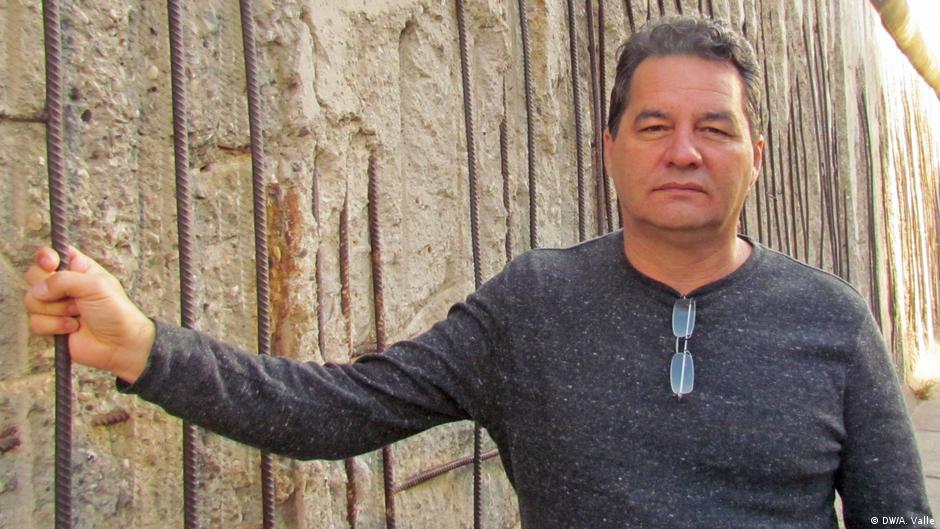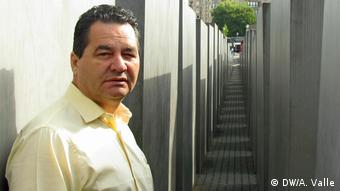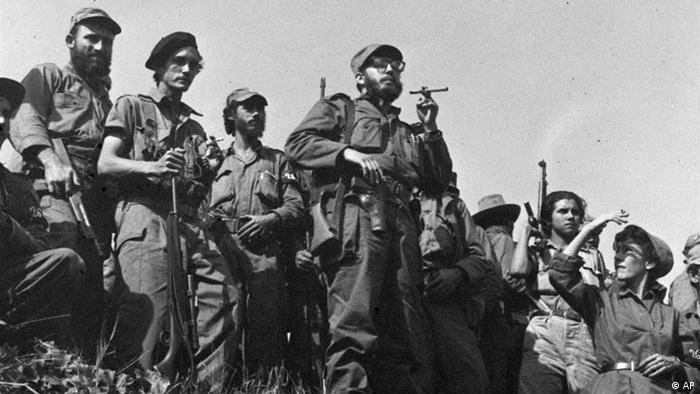
Deutsche Welle, Amir Valle with Angel Santiesteban, 18 September 2018 — Invited to the International Festival of Literature in Berlin, the Cuban writer Ángel Santiesteban speaks with Deutsche Welle (“DW”) and criticizes the passivity of the European Union and international public opinion in the face of the tragic situations in Cuba, Venezuela and Nicaragua.
Considered one of the most important Latin American writers at present, the Cuban writer Ángel Santiesteban was condemned to five years in prison for opening his blog in 2007, “The Children that Nobody Wanted” to give his opinion about the political and social disaster imposed by Castroism in Cuba.
Beginning from that moment, his life became a struggle against governmental censorship and for democracy on the island. In 2014, Reporters without Borders elected him among its 100 Information Heroes in the world. The Cuban Government prevented him from traveling outside the island for 10 years, but he finally was able to visit Berlin, in order to present the German edition of his book of short stories, Lobos en la noche (Wolves in the Night), published by the prestigious publisher, Fischer.
DW spoke with him, in his role as intellectual and dissident, about matters of relevance that mark his life and that of Cubans.
DW: “Europe has legitimatized the Cuban dictatorship” is a recurring phrase in your interviews.

Ángel Santiesteban: Talking with a Regime that has shown for decades that it does not believe in dialogue legitimizes it. That’s undeniable. There have always been businessmen flirting with Castroism, but it’s understandable, since the only thing that matters to them is making a profit by being in Cuba. But to have a business based in a region that is struggling to establish what they call “the State of Wellbeing and Rights” is an enormous contradiction and, in many ways, shameless.
Since the European Union decided to sit down and talk with Cuba, the only thing we’ve seen is that it has had to cede time and time again to Havana’s demands, and that the dictatorship has repressed the opposition with more force, since it has seen that no one questions its violations. The same thing is happening in Venezuela, in Nicaragua. Europe has left us alone to confront the dictators. And that makes it responsible for our suffering and our dead.
As an opponent, in your blog, you were one of the most concerned with denouncing the responsibility of the Cuban Government for those social disasters that we see in Venezuela and Nicaragua.
I believe that what’s called the “Free World” should once and for all condemn the Regime openly, and not just with timid sentences, for the moral support and advice in many areas that the Castros give to Maduro in Venezuela and to Ortega in Nicaragua.
Castroism has always been a parasitic government: first, the Russians and the socialist camp, then Venezuela. It’s a parasitism disguised as “the struggle for the rights of the poor in Latin America,” and now we know how many dead were the result of Fidel Castro’s promotion of the guerrillas in the region, not to mention that those guerrillas ended up being terrorists and narcotraffickers supported by the Cuban dicatorship.
Later, Fidel Castro and Chávez invented the poorly named Bolivarian Alternative for the Americas (ALBA), supposedly to defeat the neoliberalism and impose 21st-century socialism: another failure encouraged only by Castroism. And now, with their plan of extending socialism throughout Latin America, they behave like what they are: dictators, because they know that the “Free World” will criticize them only with politically correct words.
As a protagonist of Cuban culture, you have demonstrated against the most recent Cultural Law, Decree No. 349. Is it really dangerous?
From the time he came to power in 1959, Fidel Castro knew that he had to keep a lid on freedom of creation and expression. But with the exception of Law 88 directed at journalism, which we opponents call the “Gag Law”, all artistic censorship has been based on the application that the cultural commissars made from those famous words of Fidel: “Inside the Revolution, everything; outside the Revolution, nothing.”
But now the censorship is law: among many other obstacles, it limits the freedom of creative expression, then criminalizes and punishes those who try to show their work in public without the approval of governmental institutions. But the intellectuals are gagged by fear, and very few have raised their voices against it. Only the independent cultural opposition movement is protesting against this legalization of censorship.
Many people don’t understand that a large part of the Cuban opposition supports the North American president who is the most controversial of the last 100 years: Donald Trump.
Although there were some timid openings in economic matters, increasingly, as far as achievements in human rights go, we know what a failure Obama’s politics were for opening a supposed “new era” between Cuba and the United States. We can today question Trump’s other measures, but his pragmatism makes him understand that you can’t have a conversation with someone who doesn’t want to listen.
People who criticize our support of Trump should go to Cuba and suffer all the repression that has fallen on us since Raúl Castro saw that his eternal enemy, the United States, was ready to sit down and negotiate, and placed human rights last in the list of demands of the Cuban dictatorship. Trump, whatever you say about him, has leapt into first place in resepct to demanding that Castroism should grant human rights to Cubans.
Author: Amir Valle (CP)
Reproduced on Angel Santiesteban’s Blog
Deutsche Welle is the international network of Germany and produces independent journalism in 30 languages. Follow us on Facebook, Twitter and YouTube.

THE END OF THE CASTRO ERA IN CUBA
1959 – The Triumph of the Revolution
The rebels, led by Fidel Castro, come to power after expelling the dictator Fulgencio Batista in January. The United States recognizes the new government. Soon “revolutionary laws” (such as agrarian reform) affect U.S. businesses. In December, Republican President Dwight D. Eisenhower approves a CIA plan to overthrow Castro in one year and substitute “a junta friendly to the U.S.”
Recent coverage of Cuba from DW
NO TO DECREE #349: AGAINST THE “CRIMINALIZATION OF ART” IN CUBA
One of the first decrees signed by the new Cuban President, Miguel Díaz-Canel, penalizes independent art on the island and denounces artists and activists. Their protests have been repressed by the authorities. (August 29, 2018)
POSADA CARRILES: HERO AND VILLAIN IN DEATH
While Cuba and Venezuela announce “A terrorist has died without paying for his crimes,” intellectuals and Latin American political exiles hope to one day know the true face of this man. (May 24, 2018)
BOOK FAIR IN HAVANA: LIGHTS AND SHADOWS
Although thousands of Cubans attend the book fair, Cuban writers and intellectuals say that the International Book Fair is no longer as important for Cuban letters as it was in the ’90s. (February 10, 2018)
THE END OF THE CASTRO ERA IN CUBA
Almost no one in Cuba can remember life without the Castros. Since April 19, there hasn’t been a Castro at the front of the State. For almost 60 years, the brothers Fidel and Raúl have governed the country with an iron hand. (April 18, 2018).
Translated by Regina Anavy
